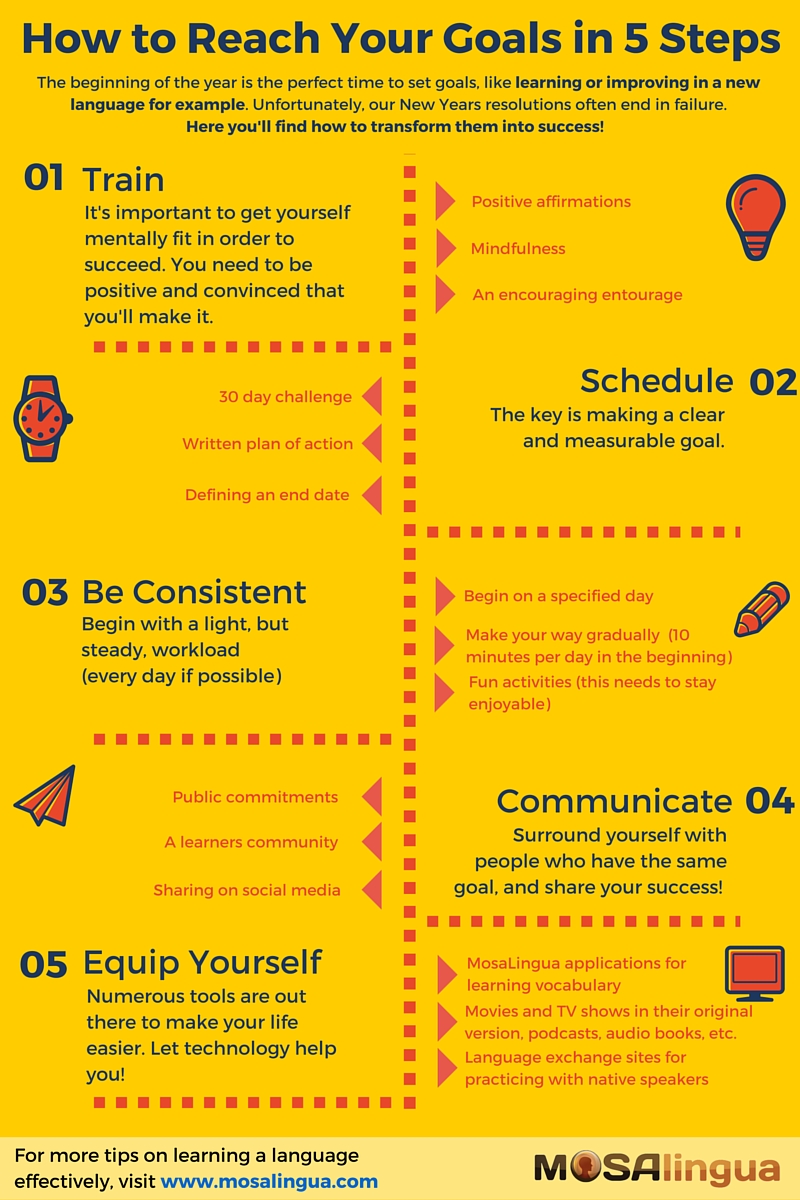Around this time, it’s important to take stock of the past year, even more so when you are making new goals for the year to come. At some point or another, I think all of us have tried to seize the opportunity of a brand new year to change something about our life. Only to realize weeks or even days later that, once again, we were unable to keep our resolutions. In fact, a 2007 study showed that 88% of New Years’ resolutions end in failure.
While we’re often filled with good intentions, we’re bad at capitalizing on them. I can hear you telling yourself that 2021 is finally the year you’ll learn a language. However, it isn’t easy to change your habits and integrate a new activity into your schedule, two keys to successful learning. And it’s for this reason that our positive New Year’s resolutions often end up failing. So to help you start off the year off right, we give you our 5 best tips for making 2021 the year you achieve your goals and finally succeed at learning a language.

How to Keep Your Resolution of Learning a Language This Year
Click on the image to enlarge it:
Copy this code to share our infographic on your site
Keep Your New Year’s Resolutions Alive and Achieve Your Goals in 5 Simple Steps
1. Rethink
Before starting off on this adventure, you need to rid yourself of any negative preconceptions you may have. Thoughts like, “I’ll never get past this roadblock I’ve hit in Spanish” or “I’m horrible at languages” will get you nowhere. All you’re doing is falsely rationalizing why you “can’t” speak the language you want – which isn’t true at all. When you think about how children learn to talk, it really is child’s play! There are tons of methods for rerouting your thoughts, for example, you could:
- Repeat positive affirmations regularly
- Practice mindfulness meditation to become more present and see the path to your goals more clearly
- Surround yourself with people who understand and encourage you
2. Schedule

That’s why it’s crucial to make your resolutions clear, specific and, above all, realistic. What is it you want: to be able to speak? to broaden your vocabulary? Or maybe you just want to be able to read the newspaper?
Mastering a language means learning and practicing lots of different skills. And it’s very tempting to try and work on several skills at once – and to overwork yourself. So from the very beginning, target the skills you want to acquire. Then, it’s important to come up with a measurable index for this skill (“I want to reach a B1 level in reading,” for example), and an end date.
To create a great schedule, you could:
- Start a 30-day challenge
- Formulate a written plan with a realistic goal, your motivations behind it, the steps you’ll take to achieve it, and possible obstacles you’ll come across during the next 30 days
- Set an end date (we don’t like the word “deadline”) for this first learning phase
3. Be consistent
From the time we first start learning a language, it’s necessary to turn language practice into a habit. And we know that a habit takes at least a month to develop. So you cannot get discouraged during this period! Don’t overburden yourself with goals, and make sure you don’t lose interest.
In all, keep learning fun and enjoyable. Also, use the services of a tutor or take formal courses to keep yourself motivated. So to summarize this step, make sure to:
- Begin with short but sweet, regular learning sessions (10 minutes is great for the beginning)
- Increase your workload, but only a little at a time
- Don’t overdo it only get to sick of the language you’re learning
4. Communicate
A perfect way to keep your motivation intact is by sharing your goal with others. This can take many forms. You can start by making a commitment to learning a language this year with a group of family or friends. This creates a responsibility towards others that you wouldn’t want to renege on.
Along the same lines, you could join groups of people who are learning the same language (in “real life” or online). A group dynamic can be a strong force for keeping your will to learn over the long term. Communicating and sharing your goals, progress, and difficulties on social media is also a great idea. You’ll get encouragement, create a sense of accountability, and maybe even trade learning tips. So, this year:
- Publicly commit to your goal
- Join a learning community like Italki or HelloTalk
- Share your progress on social media
5. Equip yourself properly
We live in a wonderful time, thanks to our easy access to information. Never before has so much knowledge been right at our fingertips. Use this to your advantage and make your life easier when learning a language! All your favorite foreign-language movies and TV shows are easy to find with subtitles. Thousands of ebooks are available on e-readers and tablets, and they’re easy to understand thanks to an online or ebook dictionary. And of course with the MosaLingua apps, you can learn optimally and enjoy studying vocabulary.
And that’s only the tip of the iceberg. The web is full of resources for learning foreign languages. It’s never been easier to learn a language! So give your language studies a boost by:
- Watching foreign-language movies and TV series with subtitles
- Reading books or comics on an e-reader or tablet
- Using your MosaLingua app to memorize new vocabulary quickly and efficiently
Those are our tips for all of you who are heading off into 2021 with a resolution to learn a new language – concrete steps to help you achieve your goals. Don’t forget that there are thousands, if not millions, of people who have done this before. It isn’t impossible! The entire MosaLingua team joins me in wishing you a happy 2021, full of joy and – most importantly – success!

Related posts:
Want to start improving your language skills today?
Start learning a new language today

Good news: we can help!
More good news: you can get started for free! Start your free trial now and for the next 15 days, take advantage of the most effective language learning method on the market!
Vocabulary flashcards, videos with subtitles, audiobooks, articles adapted to your level – with MosaLingua Premium (Web & Mobile), you’ll have access to all this and more. Get started right now. It’s free—and risk-free—to try!





Thank you for these tips ! I’ll take note of them for future references. But on a personal note, I think that schedule bears the most; most people try to exert effort n studying / learning but since the time-frame for them to learn is cut-short it is not conducive and tend to lose more. I hope to hear more of your thoughts regarding this.
Regards,
Very true Luca, most of the resolutions that people make end up failing and its because they don’t stick to the plan. Consistency is something that everyone needs to survive this. I also feel that there is something that you should add to that list too. “Setting realistic goals” If someone says that they want to master 15 languages, that’s some far-fetched fiction that is out of this world which we are sure will not happen. Thanks a lot for sharing this.
Cindy
Hi Cindy,
Thanks for your comment! You are absolutely correct about setting realistic goals. If you set attainable goals you are more likely to make progress and feel motivated to grow your objectives and make real progress. Being unrealistic can sometimes make one feel discouraged. We should all keep that in mind.
Happy learning!
Diana